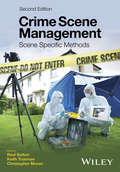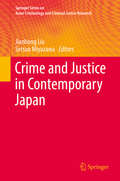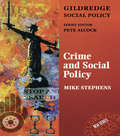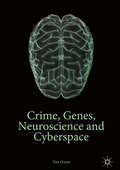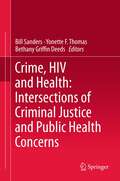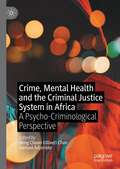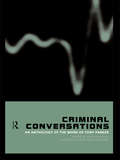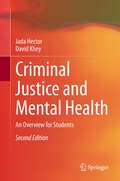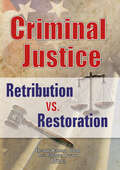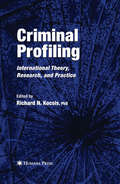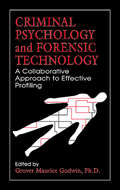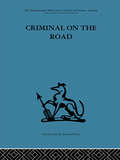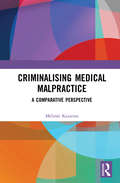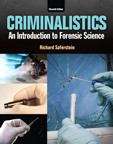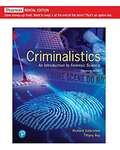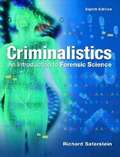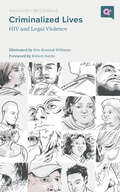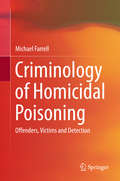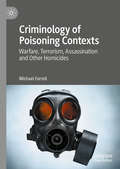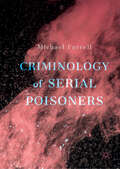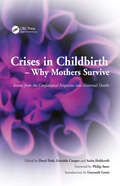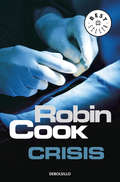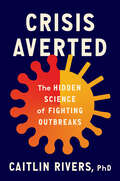- Table View
- List View
Crime Scene Management: Scene Specific Methods
by Christopher Moran Keith Trueman Raul SuttonSecond edition of an established text on common procedures for the identification and processing of evidence at scenes of crime Includes chapters on quality assurance and credibility of practices and processes issues surrounding major and complex crime Forensic handling of mass fatalities Crime scene reconstruction and impact on evidence recovery processes
Crime Scene Management: Scene Specific Methods
by Christopher Moran Keith Trueman Raul SuttonSecond edition of an established text on common procedures for the identification and processing of evidence at scenes of crime Includes chapters on quality assurance and credibility of practices and processes issues surrounding major and complex crime Forensic handling of mass fatalities Crime scene reconstruction and impact on evidence recovery processes
Crime and Justice in Contemporary Japan (Springer Series on Asian Criminology and Criminal Justice Research)
by Jianhong Liu Setsuo MiyazawaThis book provides an important overview of key criminology and criminal justice concerns in Japan. It highlights similarities between the practice of criminology research in Japan, as well as important differences, with other areas of Asia and with the West. In previous decades, Japan attracted international attention as the only industrialized country where the crime rate declined along with a rise in urbanization and economic development. Currently, Japan still enjoys a declining crime rate (the lowest among major industrialized countries) and a study of criminal justice practices in Japan may provide important insights for other regions. Japan also experiences important contemporary challenges which are shared by other regions: 1. Japan has the highest proportion of people over the age of 60 in the world. For criminology, this means key challenges in the victimization of older people, as well as the challenges of an aging prison population. 2. Besides the United States, Japan is the only developed country that still practices capital punishment, and its rate has been on the rise in the past 20 years. 3. Japan has also introduced new reforms in its law practice, including the introduction of new trial formats. The research in this book provides a helpful overview for scholars interested in criminology and criminal justice in Japan to understand the key issues of concern, and present a framework for future research needs. It will be of interest to researchers in criminology and criminal justice, international studies, Asian Studies, sociology, and political science.
Crime and Social Policy (The Gildredge Social Policy Series)
by Mike Stephens Dr Mike StephensCrime and Social Policy discusses the criminal justice system in England and Wales in an accessible and engaging manner. This title guides students through the system's complexities, reviewing its history, highlighting current problems, and offering recommendations as to where and how it can be improved.
Crime, Genes, Neuroscience and Cyberspace
by Tim OwenThis book applies Owen's unique genetic-social framework to the study of crime and criminal behaviour, with an emphasis on cybercrime. Moving beyond challenges which confront contemporary criminological theorizing such as: the stagnation of critical criminology, the relativistic nihilism of the 'cultural turn', posthumanism, and virtual criminology, the author codifies and 'applies' the latest version of the framework to the study of crime, both in and out of cyberspace. Drawing upon evolutionary psychology, behavioural genetics and the philosophy of Heidegger, he introduces new terms such as 'Neuro-Agency' and notions of Embodied Cognition into criminological theorizing. Adopting a soft compatibilist approach to free-will, and Realist ontology, Owen's meta-theoretical focus provides a new direction for criminological theorizing, in particular in the direction of the conceptualization and prediction of cyber violence. Exciting and timely, this book will appeal to scholars and advanced students of criminology, law, sociology, social policy, psychology, philosophy, policing and forensic investigation.
Crime, HIV and Health: Intersections Of Criminal Justice And Public Health Concerns
by Bill Sanders Yonette F. Thomas Bethany Griffin DeedsCarefully selected to reflect the latest research at the interface between public health and criminal justice in the US, these contributions each focus on an aspect of the relationship. How, for example, might a person's criminal activity adversely affect their health or their risk of exposure to HIV infection? The issues addressed in this volume are at the heart of policy in both public health and criminal justice. The authors track a four-fold connection between the two fields, exploring the mental and physical health of incarcerated populations; the health consequences of crime, substance abuse, violence and risky sexual behaviors; the extent to which high crime rates are linked to poor health outcomes in the same neighborhood; and the results of public health interventions among traditional criminal justice populations. As well as exploring these urgent issues, this anthology features a wealth of remarkable interdisciplinary contributions that see public health researchers focusing on crime, while criminologists attend to public health issues. The papers provide empirical data tracking, for example, the repercussions on public health of a fear of crime among residents of high-crime neighborhoods, and the correlations between HIV status and outcomes, and an individual's history of criminal activity. Providing social scientists and policy makers with vital pointers on how the criminal justice and public health sectors might work together on the problems common to both, this collection breaks new ground by combining the varying perspectives of a number of key disciplines.
Crime, Mental Health and the Criminal Justice System in Africa: A Psycho-Criminological Perspective
by Heng Choon Oliver Chan Samuel AdjorloloThis book aims to serve as a comprehensive resource for a myriad of crime and mental health topics and issues in the African criminal justice system from a psycho-criminological perspective. Crime, Mental Health and the Criminal Justice System in Africa: A Psycho-Criminological Perspective is an ideal primary text for courses in criminology, criminal justice, and forensic psychology, as well as asource of reference for practitioners who deal with offenders or victims.“For a long time, African historiography has been viewed and interpreted from Eurocentric perspectives. This book is a timely contribution towards infusing Afrocentric perspectives in African scholarship by indigenous scholars. The authors’ interdisciplinary topical approach, covering a gamut of topics ranging from African criminology, through mental health and psychology, to criminal justice systems, has lent a decolonizing voice toward African literary pursuit and thereby laid a solid foundation for further research by other scholars. I highly recommend it to readers, academic institutions and researchers on Africa.”– Emmanuel Onyeozili, Ph.D., Professor of Criminology and Criminal Justice, Department of Criminal Justice, University of Maryland Eastern Shore, USA“This edited volume by an array of experts from West and Southern Africa has given a refreshing voice to psycho-criminological narratives in the continent. In a region of the world in which there is insufficient documentation of the patterns, determinants and outcomes of criminal behaviour, this book offers a culturally competent and contemporary flavour to an ancient discourse. Its focus on new areas of concern such as online dating scams, kidnapping and the mental health of officials in the criminal justice system compellingly captures the potential reader and gives good value for time. It is warmly recommended for its breadth of coverage, the authority of its claims and the multi-disciplinary outlook of its authors.”– Adegboyega Ogunwale, MBBS, FWACP, Consultant Psychiatrist, Forensic Unit, Neuropsychiatric Hospital, Aro, Ogun State, Nigeria “This collection represents a significant step in the study of mental health, crime and criminal justice in sub-Saharan Africa. The breadth of topics covered is impressive, with each contribution based on methodologically-sound empirical analyses. It deserves to become a key reference for students, researchers and policy makers interested in suicide, drug use, violence, the work of prison officers, criminal investigations, and police-community interactions.”– Justice Tankebe, Ph.D., Lecturer, Institute of Criminology, University of Cambridge, UK “Mental health and criminal justice issues are growing problems facing the world today. Questions about whether mental health affects crime or whether involvement in the criminal justice system affects an individual’s health have become part of national policy discussion. This nicely written book brings together eminent scholars and experts with extensive experience in their various fields to address these and other questions related to crime, mental health, and criminal justice in Africa. The editors did well to coordinate the efforts of the contributors into a valuable pierce. I highly recommend it for all who are interested in the nexus between crime, mental health, and criminal justice systems.”– Francis D. Boateng, Ph.D., Assistant Professor, Department of Criminal Justice and Legal Studies, University of Mississippi, USA
Criminal Conversations: An Anthology of the Work of Tony Parker
by Keith SoothillThis anthology, selected by Tony Parker shortly before his death in 1996, provides the very essence of his quite distinctive contribution to criminology. In it he speaks intimately to all kinds of people including offenders, inadequates, professional criminals, sex offenders, frauds and false pretence merchants and prisoners on death row. Lyn Smith concludes with some reflections on his methodology. This collection celebrates an outstanding body of work and provides a fascinating insight into the criminal mind and experience. It will be compelling reading not only for those studying criminology, probation or prison studies, but also for the interested general reader.
Criminal Justice and Mental Health: An Overview for Students
by Jada Hector David KheyThis textbook provides an overview of the overlap between the criminal justice system and mental health for students of criminology and criminal justice. It provides an accessible overview of basic signs and symptoms of major mental illnesses and size of scope of justice-involved individuals with mental illness. In the United States, the law enforcement and the criminal justice system is often the first public service to be in contact with individuals suffering from mental illness or in mental distress. Those with untreated mental illnesses are often at higher risk for committing criminal acts, and due to a lack of mental health facilities, resources, and pervasive misconceptions about this population, those with mental illness often end up in the corrections system. This timely work covers the roles of each part of the criminal justice system interacting with mentally ill individuals, from law enforcement and first responders, social services, public health services, sentencing and corrections, to release and re-entry. It also addresses the crucial need of mental healthcare for criminal justice professionals, who suffer from high rates of job stress, PTSD, and other mental health issues. With new chapters on stigma, mental illness during and after disaster and crisis, and updates and new supplementary materials throughout, this book will be of interest to students of criminology and criminal justice, sociology, psychology, and public health. It will also be of interest to policy-makers and practitioners already working in the field, interacting with and addressing the needs of mentally ill individuals.
Criminal Justice: Retribution vs. Restoration
by Eleanor Hannon JudahThere are nearly two million inmates in America today. Are there better alternatives to incarceration? Criminal Justice: Retribution vs. Restoration presents new answers and unconventional suggestions addressing America&’s overcrowded prisons and jails, high recidivism rates, and weakened family and community relationships with ex-prisoners. Experts in the field discuss the benefits and failures of America&’s criminal justice system at various times in history and today, then explore possibilities to improve on that system. This groundbreaking book introduces encouraging, therapeutic approaches to criminal justice that include treatment, rehabilitation, and the direct involvement the victims, the families, and the communities. Criminal Justice looks at America&’s over-reliance on punishment and retribution as the means of responding to prevalent social problems and examines the justice system&’s tendency to incarcerate-rather than treat-minority, mentally ill, poor, and drug-dependent offenders. The authors-who are all active in some field of criminal justice-argue for a restorative model of correction that is more humane to both offenders and victims. This model opens up dialogue between offenders and their victims, families, and communities by promoting hallmark programs, including victim offender mediation, conferencing, peacemaking circles, restitution, and community projects and services. Criminal Justice includes such intriguing topics as: the social costs and moral economy of incarceration drug policy-should drug users be incarcerated or rehabilitated? the potential of restorative justice-a first-hand account from a prison inmate restorative justice and faith communities the practice and efficacy of restorative justice the path from fury to forgiveness-the emotions of the mother of a murdered child strategies for creating safe and just communities women in prison-their special needs both during incarceration and after re-entry social work and criminal justice-how they work together grassroots advocacy for criminal justice reform-a look back over the last 30 years by the founders of CURE (Citizens United for Rehabilitation of Errants) This book&’s foundation rests on the Biblical concepts of restoration, healing, forgiveness, reconciliation, and responsibility. Criminal Justice: Retribution vs Restoration is an eye-opening look at the negative effects of our current system of blame and punishment and offers hope for better, more humane methods in the future. This holistic, empowering, and strengths-based perspective offers insight and suggestions that are valuable for students, social workers, policymakers, and criminal justice professionals.
Criminal Law, Philosophy and Public Health Practice
by John Coggon A. M. Viens A. M. Viens John Coggon Anthony S. KesselThe goal of improving public health involves the use of different tools, with the law being one way to influence the activities of institutions and individuals. Of the regulatory mechanisms afforded by law to achieve this end, criminal law remains a perennial mechanism to delimit the scope of individual and group conduct. Utilising criminal law may promote or hinder public health goals, and its use raises a number of complex questions that merit exploration. This examination of the interface between criminal law and public health brings together international experts from a variety of disciplines, including law, criminology, public health, philosophy and health policy, in order to examine the theoretical and practical implications of using criminal law to improve public health.
Criminal Profiling: International Theory, Research, and Practice
by Richard N. KocsisIn this book, renowned profiler Dr. Richard Kocsis presents a distinct approach to profiling called Crime Action Profiling or CAP. The volume explains the scope and methodology employed in the studies that the author has undertaken over the past decade and a half. CAP adopts the view that profiling essentially represents a psychological technique that has its foundations in the disciplinary knowledge of forensic psychology.
Criminal Psychology and Forensic Technology: A Collaborative Approach to Effective Profiling
by Grover Maurice GodwinOffender profiling has been developing slowly as a possible investigative tool since 1841 and the publication of Edgar Allen Poe's The Murder in the Rue Morgue. In this book, detective C. Auguste Dupin demonstrates the ability to follow the thought patterns of a companion while they stroll through Paris for 15 minutes without speaking a word. Today
Criminal on the Road: A Study of Serious Motoring Offences and Those Who Commit Them (International Behavioural And Social Sciences Ser. #Vol. 25)
by T. C. WillettTavistock Press was established as a co-operative venture between the Tavistock Institute and Routledge & Kegan Paul (RKP) in the 1950s to produce a series of major contributions across the social sciences. This volume is part of a 2001 reissue of a selection of those important works which have since gone out of print, or are difficult to locate. Published by Routledge, 112 volumes in total are being brought together under the name The International Behavioural and Social Sciences Library: Classics from the Tavistock Press. Reproduced here in facsimile, this volume was originally published in 1964 and is available individually. The collection is also available in a number of themed mini-sets of between 5 and 13 volumes, or as a complete collection.
Criminalising Medical Malpractice: A Comparative Perspective
by Mélinée KazarianThe criminalisation of healthcare malpractice has become a highly topical and somewhat controversial question in recent years. Studies have demonstrated that in England and Wales, the trend towards holding healthcare professionals to account for malpractice is rapidly growing, abolishing the deference doctors enjoyed decades ago. The changing attitude of judges to claims for clinical negligence has been well documented. The role of the criminal process in England and Wales has been less fully analysed with the criminal law playing a very limited role until recently in the regulation of poor healthcare practice. In contrast, in France, the criminal process has for a long time been invoked more readily to respond to cases of healthcare malpractice, which involved even mere errors. This book compares English and French criminal law responses to healthcare malpractice and considers what lessons the French model can provide for potential reform in England and elsewhere. The book takes the HIV-contaminated blood episode as a primary example of the different approaches France and England have in dealing with healthcare malpractice. Kazarian emphasises the impact of rules of substantive criminal law and criminal procedure on the way in which healthcare malpractice is criminalised in a given country. This book explores the key lessons to be drawn on whether the criminal process is an appropriate means to respond to instances of healthcare malpractice. It proposes that features of French criminal law and criminal procedure might be useful to counteract healthcare malpractice.
Criminalistics: An Introduction to Forensic Science
by Richard SafersteinThis best-selling text, written for the non-scientist, is appropriate for a wide variety of students, including criminal justice, law enforcement, law, and more! Criminalistics: An Introduction to Forensic Science, 11e, strives to make the technology of the modern crime laboratory clear and comprehensible to the non-scientist. The nature of physical evidence is defined, and the limitations that technology and current knowledge impose on its individualization and characterization are examined. By combining case stories with applicable technology, Criminalistics endeavors to capture the pulse and fervor of forensic science investigations. A major portion of the text centers on discussions of the common items of physical evidence encountered at crime scenes. These chapters include descriptions of forensic analysis, as well as updated techniques for the proper collection and preservation of evidence at crime scenes. Particular attention is paid to the meaning and role of probability in interpreting the evidential significance of scientifically evaluated evidence.
Criminalistics: An Introduction to Forensic Science
by Richard Saferstein Tiffany RoyA clear introduction to the technology of the modern crime laboratory for non-scientists <p><p>Criminalistics: An Introduction to Forensic Science uses clear writing, case studies, and modern technology to reveal the essence of forensic science. The text aims to make the subject of forensic science clear and comprehensible to a wide variety of readers, from future forensic scientists to those curious about the subject. The nature of physical evidence is defined, and the limitations that technology and current knowledge impose on its individualization and characterization are examined. <p><p>Updated throughout, the 13th Edition includes new information on interpreting blood stain patterns, genotyping, and bite mark comparison.
Criminalistics: An Introduction to Forensic Science (8th Edition, College Version)
by Richard SafersteinThe text covers the comprehensive realm of forensics and its role in criminal investigations. Physical evidence collection and preservation techniques are examined in detail including chapters on Computer Forensics and DNA.
Criminalized Lives: HIV and Legal Violence (Q+ Public)
by Alexander McClellandCanada has been known as a hot spot for HIV criminalization where the act of not disclosing one’s HIV-positive status to sex partners has historically been regarded as a serious criminal offence. Criminalized Lives describes how this approach has disproportionately harmed the poor, Black and Indigenous people, gay men, and women in Canada. In this book, people who have been criminally accused of not disclosing their HIV-positive status, detail the many complexities of disclosure, and the violence that results from being criminalized. Accompanied by portraits from artist Eric Kostiuk Williams, the profiles examine whether the criminal legal system is really prepared to handle the nuances and ethical dilemmas faced everyday by people living with HIV. By offering personal stories of people who have faced criminalization first-hand, Alexander McClelland questions common assumptions about HIV, the role of punishment, and the violence that results from the criminal legal system’s legacy of categorizing people as either victims or perpetrators. Note: A regrettable error appears on page 22. The number 240 should be 206 when referring to the number of people prosecuted in relation to allegations of HIV nondisclosure. This will be fixed in future reprints.
Criminology of Homicidal Poisoning: Offenders, Victims and Detection
by Michael FarrellThis book provides an overview of historical and contemporary cases of homicidal poisoning. While homicidal poisoning is sometimes thought of as a thing of the past, it continues to be a contemporary problem, and in fact the unknown offender rate for poisoning cases is 20-30 times that of other homicide types in contemporary research, and many poisoners commit serial homicides while going undetected. The author of this important and timely work explores the theoretical bases for understanding homicidal poisoning, the nature of poisons used in homicidal cases, the characteristics of poisoners and their victims, and techniques for detection and prevention. This unique book will be of particular interest to: students of criminology (classes dealing with criminal psychology, and murder investigation); students of the history of crime; criminal justice professionals: attorneys, homicide detectives, forensic pathologists, forensic and clinical toxicologists, and other forensic investigators; and all interested in poisons, poisoners and the detection of poisoning. It has relevance to criminology, law and policing, toxicology and forensic science, the history of crime and detection, and criminal psychology.
Criminology of Poisoning Contexts: Warfare, Terrorism, Assassination and Other Homicides
by Michael FarrellThis accessible book examines poisoning in various contexts of international conflict. It explores the modern-day use of poison in warfare, terrorism, assassination, mass suicide, serial poisoning within healthcare, and as capital punishment. It examines a broad range of international cases from the Americas, Europe, Japan, India and more in relation to Situational Crime Prevention and its theoretical precursors, in order to explore potential prevention strategies and the ways in which perpetrators circumvent them. Case studies include analysis of attempts on the lives of Sergei and Yulia Skripal, the Tokyo subway attacks, the crimes of Dr. Harold Shipman and the Heaven's Gate and Jonestown cults. For each, the means, motive, opportunity, location, and perpetrator-victim relationship is examined. This accessible book speaks to students of criminology and those interested in penology, careers in criminal justice, homicide detectives, anti-terrorism personnel, forensic pathologists and toxicologists.
Criminology of Serial Poisoners
by Michael FarrellThis book examines serial homicidal poisonings in the modern era, to improve our contemporary understanding of poisons, poisoners, and investigation. Drawing on cases of serial poisoning from around the world, the book defines key terms, examines theories and explanations of serial homicide in relation to serial poisoning, explores the features of the poisons and examines the demographic characteristics of perpetrators of serial poisoning and their victims. It considers healthcare serial poisoning as a specific issue. Overall, it provides an outline for developing a criminology of serial poisoning homicide.
Crises in Childbirth - Why Mothers Survive: A Systems-Based Competencies Approach, Parts 1&2, Written Examination Revision Guide
by Griselda Cooper Daryl Dob Anita HoldcroftThis work includes Foreword by Phillip J S Steer, Professor of Obstetrics, Faculty of Medicine, Imperial College London. It includes Introduction by Gwyneth Lewis, National Clinical Lead for Maternal Health and Maternity Services, Department of Health, England and Director of the UK Confidential Enquiries into Maternal Deaths. 'The reductions in maternal mortality over the last half century are an eloquent testimony to the value of the technical expertise in life support that anaesthetists bring to the management of labour complications. Many direct causes of maternal death have been substantially reduced as a result of anaesthetic innovations ranging from advances in regional anaesthesia to the panoply of techniques used in intensive care. This book is essential reading.' - Phillip J Steer, in his Foreword. Offering a unique insight into real cases, this book covers the physiology, pharmacology and organisational factors involved in previous maternal deaths, highlighting key lessons to be learnt. This practical guide provides an ideal introduction for new anaesthetists and up-to-date information for senior practitioners, particularly those who cover labour wards. It is also invaluable for anaesthetic nurses, obstetricians and midwives. 'For more than 50 years the Confidential Enquiries into Maternal Deaths in the UK have collected together invaluable information about why mothers die in pregnancy and childbirth. For the first time ever, this unique book collects together all the valuable lessons into one volume. Experts in their fields provide a physiological, pharmacological, and evidence based commentary on the events of each death. The overall result pays homage to the value of collecting together lessons from the past, and we hope will help people avoid repetition of these situations in the future.' - Daryl Dob, Anita Holdcroft and Griselda Cooper, in the Preface.
Crisis
by Robin CookRobin Cook, el inventor del thriller médico, revela en esta novela el lado más oscuro de la profesión. Cuatro días antes de casarse, Jack Stapleton, médico forense de Nueva York, recibe una llamada desesperada de su hermana: su marido, médico prestigioso, va a ser procesado por negligencia profesional y necesita su ayuda. A pesar de la mala relación que mantiene con su hermana y la poca simpatía que le inspira su arrogante y frío cuñado, Jack viaja a Boston con la intención de pasar solo un día allí. Sin embargo, el caso es mucho más complicado de lo que imaginaba. Aun sabiendo que pone su propia boda en juego, Jack reclama la exhumación del cadáver del paciente que supuestamente murió a causa del descuido de su cuñado. Jack está trabajando a contrarreloj para salvar al marido de su hermana de esta acusación cuando descubre algo que jamás hubiera podido imaginar... Reseña:«Realmente nadie sabe hacer thrillers médicos como Cook.»Daily Mirror
Crisis Averted: The Hidden Science of Fighting Outbreaks
by Caitlin Rivers&“[An] ambitious and... successful attempt to reset our relationship with the field of public health. With a judicious blend of candor, hopefulness and pragmatism, [Rivers] calls out its mistakes, reminds us of its historic accomplishments and emphasizes the need for the discipline to adjust its strategies if its full promise is to be realized.&”—Wall Street Journal"A master class in how we can pinpoint and prevent health crises before they spiral out of control."—Scott Gottlieb, MD, author of Uncontrolled SpreadA fascinating window into the secret life of epidemiology, weaving together stories of triumph and tragedy, with a boots-on-the-ground perspective on how we can avert the next public health crisisThere are few visible markers of the accomplishments of public health. When epidemiologists do their jobs, nothing happens. An outbreak does not grow into an epidemic. A child does not go hungry. A would-be smoker never lights up. In this fascinating window into the secret life of public health, Caitlin Rivers weaves together stories of triumph and tragedy to show that by making sure things don't happen, she and legions of scientists, practitioners, and policymakers change the course of history.We have many of the tools and experiences needed to prevent the next crisis, but as past experiences teach us, the unexpected is always around the corner. We cannot afford complacency, as countless challenges remain, including constantly emerging pathogens, the rapid growth of biotechnology, and the inconsistent cycles of funding for public health programs. Progress can be slow, but the unsung heroes in epidemiology remain focused on their missions. Crisis Averted tells their stories—from the eradication of smallpox in the twentieth century to a battle against mosquito-borne diseases in the Florida Keys to the international safeguards implemented against extraterrestrial germs. By taking a candid look at how we solve problems in public health, Caitlin Rivers illuminates the role of epidemiology in all our lives and lays out the case for what can be accomplished given sufficient vision, leadership, and resources. Crisis Averted is an inspiring and galvanizing call for us to work together towards a healthier, more resilient future.
